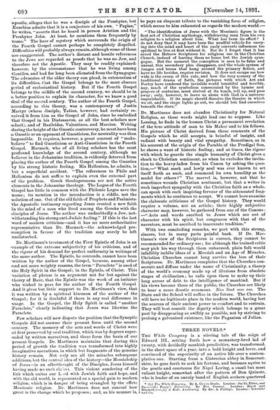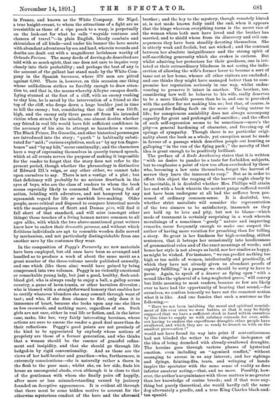THREE NOVELS.*
THE White Company is a stirring tale of the reign of Edward III., setting forth how a monastery-bred lad of twenty, with decidedly monkish proclivities, was transformed, in the short space of a year, into a bold knight and lover, and convinced of the superiority of an active life over a contem- plative one. Starting from a Cistercian abbey in Somerset- shire, he goes forth to seek his fortune, and becomes squire to the gentle and courteous Sir Nigel Loring, a *mall but most valiant knight, somewhat after the pattern of Don Quixote, who is leader of an unruly band of English archers quartered • (L) The White Company. By A. Conn Doyle. London : SmAh, Elder, and Co.—(2.) Peggy's Perversity. By Mrs. Convey. London: Hurst and Blaokett.—s3.) A RWI3 Awakening. By Ars. A. Phillips. London: Yri3olifer and Co. in France, and known as the White Company. Sir Nigel, a true knight-errant, to whom the attractions of a fight are as irresistible as those of a ripe peach to a wasp, is perpetually on the look-out for what he calls " wayside ventures and chances of travel "—in plain English, bloody combats and skirmishes of all kinds—and under his banner the hero meets with abundant adventures by sea and land, wherein wounds and deaths are dealt out with a magnificent lavishness worthy of Orlando Furioso. The many deeds of derring-do described are told with so much spirit, that one does not care to inquire very closely into their probability ; and perhaps the best of any is the account of the gallant last stand made by the White Com. pany in the Spanish barranca, where 370 men are pitted against 6,000. There is, however, on this occasion one thing whose unlikeliness strikes us forcibly enough to draw atten- tion to, and that is, the means whereby Alleyne escapes death. Lying stunned at the foot of a cliff, with an enemy rushing to slay him, he is saved by the intervention of a friend at the top of the cliff, who drops down a huge boulder just in time to kill the enemy ; but, considering that the cliff was 50 ft. high, and the enemy only three paces off from his intended victim when struck by the missile, one almost doubts whether any friend in real life would have felt sufficient confidence in the accuracy of his aim to attempt so hazardous a rescue. The Black Prince, Du Guesclin, and other historical personages are introduced into the story; " quoth " is habitually substi- tuted for " said ; " curious expletives, such as " by my ten finger- bones" and "by my hilt," occur continually; and the characters have a way of expressing themselves in queerly turned speech, which at all events serves the purpose of making it impossible for the reader to forget that the story does not refer to the present period, though whether the phraseology is distinctive of Edward III.'s reign, or any other either, we cannot take upon ourselves to say. There is not a vestige of a plot ; but that deficiency will probably be no serious drawback in the eyes of boys, who are the class of readers to whom the book seems especially likely to commend itself, as being full of action, bristling with adventure, and not hampered by any squeamish regard for life or mawkish love-making. Older people, more critical and disposed to compare historical novels with the masterpieces of Scott and Dumas pere, will find it fall short of that standard, and will miss (amongst other things) those touches of a living human nature common to all ages alike, with which the two above-mentioned great writers knew how to endow their dramatis person, and without which fictitious individuals are apt to resemble wooden dolls moved by mechanism, and not particularly distinguishable from one another save by the costumes they wear.
In the composition of Peggy's Perversity no new materials have been employed, but old ones have been so arranged and handled as to produce a work of about the same merit as a great number of the three-volume novels published annually, and one which (like them also) would have gained by being compressed into two volumes. Peggy is no violently emotional or remarkable young lady, but just a good, healthy, flesh-and- blood girl, who is always ready to enjoy a ball, a gallop across country, a game of lawn-tennis, or other harmless diversion ; who is blessed with a straightforward honesty that enables her to rectify whatever blunders she may commit through want of tact ; and who, if she does chance to flirt, only does it in innocence of heart, because she looks upon any one she likes as bon camarad,e, and nothing more, regardless of sex. Such girls are not rare, either in real life or fiction, and, in the latter case, make, like her, very fairly interesting heroines, whose actions are sure to amuse the reader a good deal more than do their reflections. Peggy's good points are not precisely of the kind to be appreciated by anybody whose notions of propriety are those of a former generation, and who thinks that a woman should be the essence of graceful refine- ment and insipidity, and that she should go through life hedged-in by rigid conventionality. And as these are the views of her half-brother and guardian—who, furthermore, is extremely conscientious—she is naturally rather a thorn in the flesh to the poor man ; whilst she, on her side, finds his house an uncongenial abode, even although it is close to that of the gentleman with whom she finally pairs off happily, after more or less misunderstanding caused by jealousy founded on deceptive appearances. It is evident all through that there must be some hidden motive to account for the otherwise mysterious conduct of the hero and the aforesaid brother ; and the key to the mystery, though remotely hinted at, is not made known fully until the end, when it appears that the hinge whereon everything turns is the secret vice of the woman whom both men have loved and the brother has married, and to shield whom from its discovery and evil con- sequences they have been steadily devoting themselves. She is utterly weak and foolish, but not wicked ; and the contrast between her absolute insignificance and the strong spirit of self-sacrificing generosity which she evokes is curious. But whilst admiring her protectors for their goodness, one is irri- tated at their extraordinary blindness in not seeing the indis- cretion of allowing the wife's former lover to become a sort of tame cat at her home, whence all other visitors are excluded ; and one thinks they might have managed better than to com- promise her reputation seriously in one way, whilst endea- vouring to preserve it intact in another. The brother, too, considering how well he behaves to his wife, really deserves to be a more likeable person than he is, and one is provoked with the author for not making him so ; but that, of course, is no ground for finding fault on the score of being untrue to life ; for conspicuous amiability does not always accompany capacity for great and prolonged self-sacrifice ; and the effect of such self-repression seems to be sometimes—more's the pity—a general hardening of character, and freezing-up of springs of sympathy. Though there is no particular origi- nality about the book as a whole, yet exception must be made in favour of a passage which describes people out hunting as galloping "in the van of the flying pack ;" the novelty of that idea is great enough to be positively brilliant.
The preface of A Rude Awakening states that it is written " with no desire to pander to a taste for forbidden subjects, but to emphasise a point of view too often overlooked by those who, becoming a law unto themselves, forget the harvest of sorrow they leave the innocent to reap." But as in order to effect this object the reaping of the harvest ought clearly to be inevitable, it is doubtful whether Mrs. Phillips will attain her end with a book wherein the acutest pangs suffered would not have been undergone at all had the sufferer been pos- sessed of ordinary common-sense. It is doubtful, too, whether strict moralists will ()consider the representation of the two sinners to be satisfactory, inasmuch as they are held up to love and pity, but not to blame—which mode of treatment is certainly surprising in a work wherein moralisings of a sometimes " goody" nature and improving remarks, occur frequently enough to make one suspect the author of having more vocation for preaching than for telling a story. So great is her fondness for high-sounding, stilted sentences, that it betrays her occasionally into heedlessness.
of grammatical rules and of the exact meanings of words ; and hence her style is not always as lucid, nor her similes as happy, as might be wished. For instance, " we can predict nothing too high or too noble of women, intellectually and practically, of which they have not already given us abundant proofs of capably fulfilling," is a passage we should be sorry to have to parse. Again, to speak of a drawer as flying open " with a sound like the upheaval of a long-neglected grave," will convey but little meaning to most readers, because so few are likely ever to have had the opportunity of hearing that sound,—for ourselves, we confess honestly we have not the remotest notion what it is like. And one fancies that such a sentence as the
following,— "Rave we not been imbibing the moral and spiritual nourish- ment of life ever since we were babies, so that it may be fairly supposed that we have a sufficient stock in hand within ourselves by this time to supply us with salutary counsels for ever, with- out having to endure the superfluous draughts other people have swallowed, and which they are so ready to drench us with on the smallest provocation ?"
would not have found its way into print if sententiousness had not blinded the writer to the singular inelegance of
the idea of being drenched with already-swallowed draughts. The heroine goes through various phases of hysterical emotion, even including an "agonised conflict," without managing to arouse in us any interest; and her sighings and dyings, fainting-fits, tears, and wringing of hands inspire the spectator with the same sense of reality as does inferior amateur acting,—that, and no more. Possibly, how- ever, the author's acquaintance with these matters is no greater than her knowledge of canine breeds ; and if that were any- thing but purely theoretical, she would hardly call the same dog alternately a poodle, and a true King Charles black-and- tan spaniel.







































 Previous page
Previous page